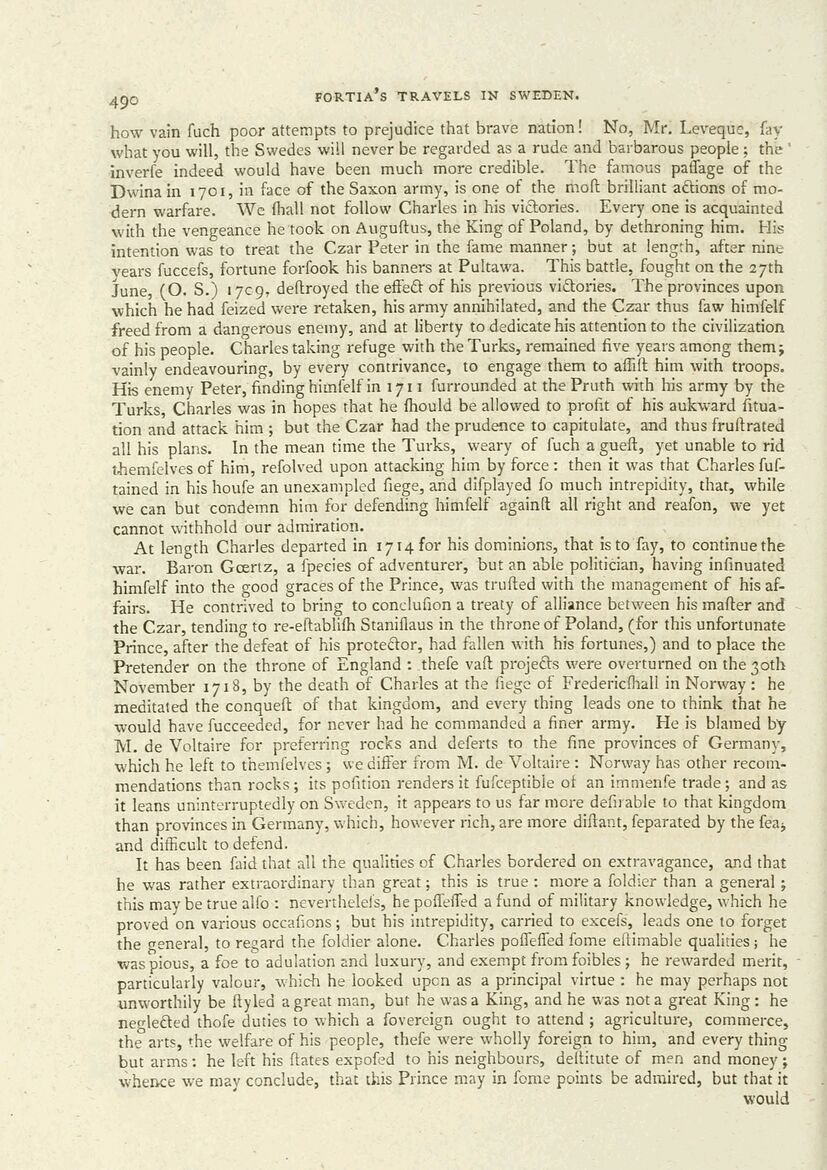
Full resolution (JPEG) - On this page / på denna sida - Pages ...

<< prev. page << föreg. sida << >> nästa sida >> next page >>
Below is the raw OCR text
from the above scanned image.
Do you see an error? Proofread the page now!
Här nedan syns maskintolkade texten från faksimilbilden ovan.
Ser du något fel? Korrekturläs sidan nu!
This page has never been proofread. / Denna sida har aldrig korrekturlästs.
490 FORTIA’S TRAVELS IN SWEDEN.
how vain fuch poor attempts to prejudice that brave nation! No, Mr. Leveque, fay
what you will, the Swedes will never be regarded as a rude and barbarous people ; the
inverfe indeed would have been much more credible. The famous paflage of the
Dwina in 1701, in face of the Saxon army, is one of the moft brilliant aétions of mo-
dern warfare. We fhall not follow Charles in his victories. Every one is acquainted
with the vengeance he took on Auguftus, the King of Poland, by dethroning him. His
intention was to treat the Czar Peter in the fame manner; but at length, after nine
years fuccefs, fortune forfook his banners at Pultawa. This battle, fought on the 27th
June, (O. S.) 17¢9, deftroyed the effe& of his previous victories. The provinces upon
which he had feized were retaken, his army annihilated, and the Czar thus faw himfelf
freed from a dangerous enemy, and at liberty to dedicate his attention to the civilization
of his people. Charles taking refuge with the Turks, remained five years among them;
vainly endeavouring, by every contrivance, to engage them to aflift him with troops.
His enemy Peter, finding himfelf in 1711 furrounded at the Pruth with his army by the
Turks, Charles was in hopes that he fhould be allowed to profit of his aukward fitua-
tion and attack him; but the Czar had the prudence to capitulate, and thus fruftrated
all his plans. In the mean time the Turks, weary of fuch a gueft, yet unable to rid
themfelves of him, refolved upon attacking him by force: then it was that Charles fuf-
tained in his houfe an unexampled fiege, and difplayed fo much intrepidity, that, while
we can but condemn him for defending himfelf again{t all right and reafon, we yet
cannot withhold our admiration.
At length Charles departed in 1714 for his dominions, that is to fay, to continue the
war. Baron Geertz, a fpecies of adventurer, but an able politician, having infinuated
himfelf into the good graces of the Prince, was trufted with the management of his af-
fairs. He contrived to bring to conclufion a treaty of alliance between his mafter and
the Czar, tending to re-eltablifh Staniflaus in the throne of Poland, (for this unfortunate
Prince, after the defeat of his protector, had fallen with his fortunes,) and to place the
Pretender on the throne of England: thefe vaft projects were overturned on the 30th
November 1718, by the death of Charles at the fiege of Fredericfhall in Norway: he
meditated the conqueft of that kingdom, and every thing leads one to think that he
would have fucceeded, for never had he commanded a finer army. He is blamed by
M. de Voltaire for preferring rocks and deferts to the fine provinces of Germany,
which he left to themfelves; we differ from M. de Voltaire: Norway has other recom-
mendations than rocks; its pofition renders it fufceptible of an immenfe trade; and as
it leans uninterruptedly on Sweden, it appears to us far more defirable to that kingdom
than provinces in Germany, which, however rich, are more diftant, feparated by the fea,
and difficult to defend.
It has been faid that all the qualities of Charles bordered on extravagance, and that
he was rather extraordinary than great; this is true: morea foldier than a general ;
this may be true alfo: neverthelefs, he pofleffed a fund of military knowledge, which he
proved on various occafions ; but his intrepidity, carried to excels, leads one to forget
the general, to regard the foldier alone. Charles poflefied fome eftimable qualities; he
was pious, a foe to adulation and luxury, and exempt from foibles; he rewarded merit, -
particularly valour, which he looked upon as a principal virtue: he may perhaps not
unworthily be ftyled agreat man, but he wasa King, and he was nota great King: he
neglected thofe duties to which a fovereign ought to attend; agriculture, commerce,
the arts, the welfare of his people, thefe were wholly foreign to him, and every thing
but arms: he left his ftates expofed to his neighbours, deltitute of men and money ;
whence we may conclude, that this Prince may in fome points be admired, but that it
would
<< prev. page << föreg. sida << >> nästa sida >> next page >>